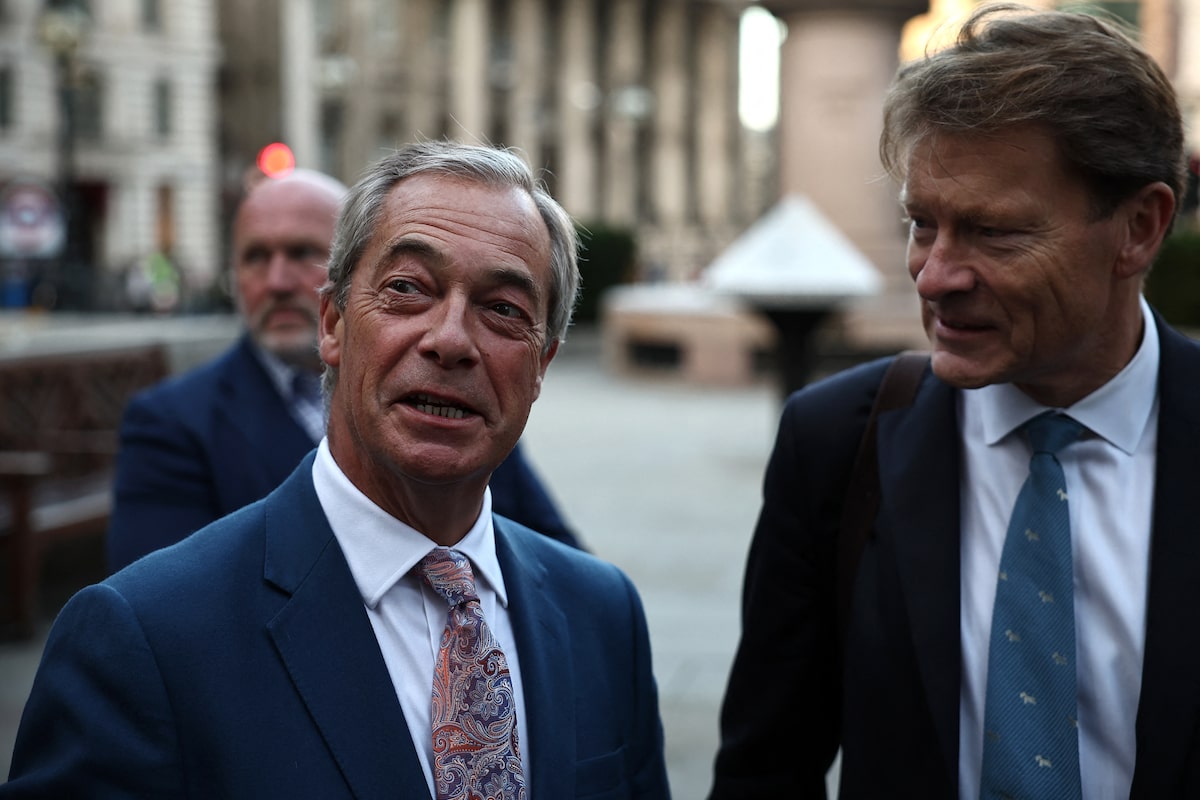Reform UK Leader Nigel Farage speaks alongside his deputy, Richard Tice, outside the Bank of England, on Thursday.HENRY NICHOLLS/AFP/Getty Images
Of the many images that one associates with Britain’s Brexit campaign, the red Vote Leave bus that travelled the country promoting the riches to be gained by departing the European Union resonates to this day.
“We send the EU £350-million a week. Let’s fund our NHS [National Health Service] instead,” said the decal on the side of the bus, which became one of the most enduring symbols of the campaign.
There was only one problem: It wasn’t true.
Next year will mark 10 years since Britain voted 51.9 per cent to 48.1 per cent to leave the EU. Brexit proponents promised it would be the beginning of great things: lower inflation, lower food prices, lower energy prices, lower clothing costs, lower booze costs. It would ignite an economic renaissance like none other.
As my father often reminded me: If something sounds too good to be true, it likely is.
Nigel Farage hails Preston Manning as his ‘inspiration,’ as Reform UK surges in polls
Of course, few of the surefire benefits that were advanced by Brexit’s proponents have come to pass. In most cases, it’s been just the opposite. Much of the Leave campaign was built on a bed of lies.
One of Leave’s biggest boosters, former Conservative Party leader, prime minister and disgraced buffoon Boris Johnson, is long gone from the political scene. Others associated with the campaign have abandoned arguing that the benefits from the decision are just around the corner and retreated into subdued silence.
Arguably, the most effective advocate for Brexit was Nigel Farage. Back in 2016 when the vote was taken, he headed the UK Independence Party.
A charismatic champion for the Leave cause, Mr. Farage urged Britons not to miss this opportunity to restore their country to greatness. But far from slinking away in shame, given how things have turned out, Mr. Farage has emerged stronger than ever as head of the Reform UK Party. That is a testament not only to his undeniable charm, but also to the unshakable, unbendable, unwavering foolishness of the average British voter.
His party has now led the polls in Britain for the past six months. If an election were held tomorrow, Mr. Farage would likely be the country’s next prime minister. This, the man who convinced a majority of the British public to vote for a decision that has set the country back years, if not decades. It’s like rewarding the captain of the Titanic with a new ship and a sea with even more icebergs.
Doug Saunders: Keir Starmer risks losing Britain in his awkward dance with intolerance
How has Mr. Farage done it? By appealing to one of the basest emotions we as humans have: fear. This summer, Mr. Farage and his party conducted a “Lawless Britain” campaign. In it, they claimed that Londoners were afraid to walk their streets at night because undocumented migrants were on the loose and threatening women and girls. He suggested the country was on the precipice of “societal collapse.” The party’s plan to deport more than 600,000 asylum seekers has received resounding support.
That’s how you get a population to forget you were the champion of one of the worst decisions the country has made in its history. The fact that more than 100,000 protesters recently jammed the streets of central London under the anti-immigrant “Unite the Kingdom” banner is evidence Reform knows of what it speaks. The rally was led by the notorious Islamophobe Tommy Robinson, who interviewed American billionaire and X owner Elon Musk via video. Mr. Musk told the crowd: “Whether you choose violence or not, violence is coming to you. You either fight back or you die.”
If you have the skills to convince people they are at risk of losing their life at the hands of some anonymous migrant, you can get them to forget how much their energy bills have gone up or how much more a pair of jeans and a shirt cost today compared to a few years ago.
You can get them to forget about all those things that were supposed to be better as a result of your brilliant plan to withdraw Britain into an isolationist shell. Today, Britain’s economy barely has a pulse: zero growth in July, 0.4 per cent in June, a whopping 0.7-per-cent expansion for the first three months of the year. To describe the country’s financial indicators as tepid would seem like aggrandizement.
It’s been a long time since Britain was a true power. You’d have to go back to the Second World War to find the last time its voice, its decisions, reverberated around the world. It’s still astounding to see how far, and how fast, it has retreated from true world relevance and consequence.
Perhaps the fact Nigel Farage could one day be the country’s next leader is all you need to know about how that demise came about.
